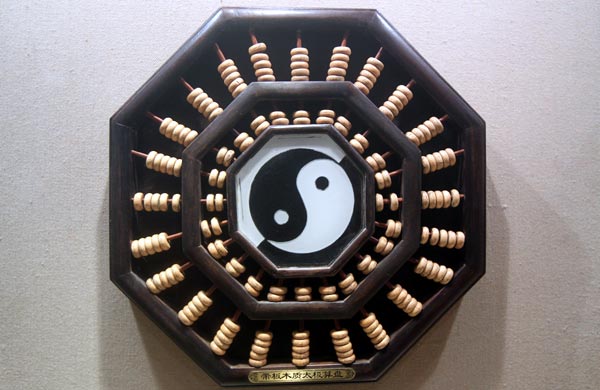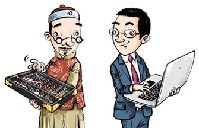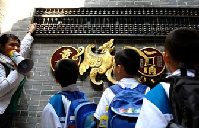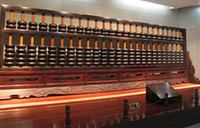Changing the equation
By Zhang Kun ( China Daily ) Updated: 2014-01-05 08:21:00
 |
|
A jade abacus with a yin-yang pattern in the center is part of the collection at the China Zhusuan Museum in Nantong in Jiangsu province. Xu Congjun / For China Daily |
|
 |
|
Culture that counts |
 |
 |
 |
The earliest historical record of the abacus appeared on the famous scroll painting Riverside Scene at Qingming Festival. Created by Zhang Zeduan (1085-1145), the 12th-century urban landscape depiction shows an abacus on the desk of an herbal medicine shop's upstairs chamber. It's clearly visible from an open window.
The oldest surviving abacus dates from between the 14th and 16th centuries, during the Ming Dynasty (1368-1644).
Ming abacuses inherited 12th-century form and structure. Abacuses were a necessity for China's merchants and clerks, until they were replaced by electronic gizmos in the late 20th century.
Ge's abacus infatuation is perhaps as rooted in his own history as his country's.
"My father died the year I was born," he says.
"My mother was 30 years old - a single mother with three children - when she enrolled in the Lixin School of Accounting (now named Shanghai Lixin University of Commerce)."
She became proficient in the abacus and supported the family as a petroleum corporation accountant.
Ge was close to an older collector, Chen Baoding. Chen left his collection to Ge when he died in his 90s.
Ge is now 63, diabetic and frail. His apprentice, 46-year-old Liu Xiangyang, joins him to treasure hunt at secondhand markets and recycling shops.
"They're often sold for no more than 100 yuan ($16) at secondhand markets. Sometimes, you find a good one - redwood or ox horn."
Antique abacuses' values are generally not determined by age and condition as much as by material, he says.
One of his prized possessions is a rosewood model that's about 70 years old and worth about 8,000 yuan.
He donated most of the thousands of abacuses he possessed to collectors, museums and accounting institutions that publicize the device's history.
Related stories:
From crunching numbers to conceiving new words
|
|
|
|
|
|
|
|





















 Raymond Zhou:
Raymond Zhou: Pauline D Loh:
Pauline D Loh: Hot Pot
Hot Pot Eco China
Eco China China Dream
China Dream China Face
China Face





